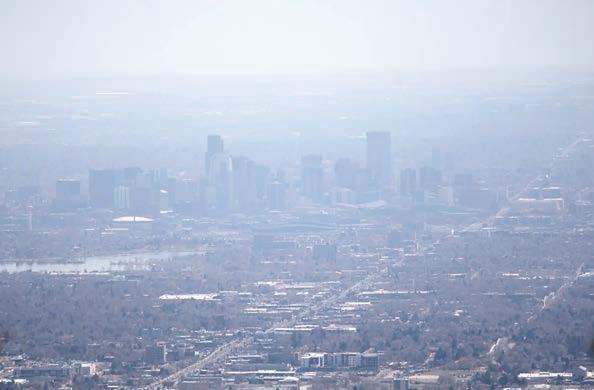
4 minute read
Front Range inches closer to banning gas-powered mowers and blowers
BY MICHAEL BOOTH THE COLORADO SUN
State air pollution o cials are likely to vote by the end of the year on a 2025 ban on the sale of push or hand-held, gasoline-powered lawn equipment in nine Front Range counties with ozone problems, after a key regional advisory council recommended the bar as an e ective strategy.

e Regional Air Quality Council’s policy recommendation also wants to ban institutions like schools or parks from using existing hand-held gas equipment in the summer months starting in 2025, and a summer ban for all commercial landscapers beginning in 2026.
e bans would not be statewide, but would cover all the counties where the EPA says air pollution exceeds ozone attainment standards and threatens the lung and heart health of millions of residents. e ban would a ect sales and use in Denver, Douglas, Arapahoe, Je erson, Adams, Broom eld, Boulder, Weld and the non-mountainous portions of Larimer counties, if approved by the state Air Quality Control Commission after deliberations this fall.
Landscape companies objected to the costs of equipment changeovers, the need to train workers, and schedule changes required by battery charging times or resupply, saying the bans could hurt an industry where Latino and other minority ownership is strong.

Environmental groups that have been pushing the state to pass sharper restrictions on ozone-causing emissions lauded the RAQC’s recommendation as a great place to start. Small lawn equipment engines burn much dirtier than modern cars, for example, and contribute an inordinate share of Front Range ozone, said Kirsten Schatz, an air pollution specialist with the nonpro t consumer group CoPIRG.
“It’s going to accelerate the shift away from the dirtiest gas-powered equipment out there,” Schatz said. “And that’s really important because we know that these tools produce a shocking amount of pollution, and it contributes to asthma and other serious health issues. So freezing them out is one critical way that we as a community can tackle our dirty air problem.” e RAQC’s recommendation, which may rst be heard by the AQCC in August, would ban the sale of new gas-powered smaller equipment in the nine-county nonattainment area on Jan. 1, 2025. It would also ban the summertime use of existing gas-powered smaller equipment by institutions or “public entities,” and the private contractors they use, starting June 1, 2025, in the same nonattainment area. And, ban commercial entities from using existing smaller gas-powered equipment during summer months starting June 1, 2026. e EPA in 2008 set national ozone health limits of 75 parts per billion, then revised it further downward in 2015 to 70 ppb. Colorado’s most populous counties have been violating those standards for years, and after some gains have recently moved again in the wrong direction.
CoPIRG and other groups say that in the smaller push mower and handheld blower or trimmer categories, highly rated battery models are now widely available that are comparable in price to many gas models, especially when available local government subsidies are factored in. Batterypowered models are not yet widely available in the lawn tractor and other large categories, thus the RAQC’s focus on bans of sales and use of equipment with less than 25 horsepower ratings.
All of the restrictions apply to internal combustion engines smaller than 25 horsepower. ere are exemptions built into the proposal that the RAQC expects the state will honor, including allowing institutional use to prepare for or clean up from emergencies, or for re mitigation.
Colorado air pollution monitoring o cials have said gas lawn and garden equipment contributes 2.5 ppb to that total on an average day. (Front Range monitors in recent summers have frequently registered daily highs 80 ppb and above.) Large portions are also blown in from out of state, or created by emissions from oil and gas production — facing multiple rounds of new controls — and vehicles, where rules have been passed to encourage transition to clean electric power. Compared to the other portions of the 70 ppb standard that Colorado has the power to control, lawn and garden equipment now stands out as an attractive target.
Air quality o cials say the staggered timing of the proposal will allow manufacturers time to develop larger electric-powered lawn equipment to satisfy commercial and institutional demands, and for homeowners and small businesses to use subsidies to change over their equipment.
Still, the Associated Landscape Contractors of Colorado asked the RAQC to consider its moves carefully, warning of potential harm to what it calls a $3 billion industry across the state.
“Unlike a homeowner that uses an electric powered leaf blower or mower for less than an hour, in a given week, the landscape industry is operating commercially using this equipment daily, under rigorous conditions and for long durations,” said a statement from the contractors submitted to the RAQC’s public hearing.
But RAQC and other o cials say that’s the same reason the controls must be extended to commercial operators: eir gas machines are running all day, every day, and contribute more to the ozone problem.
Since the homeowner equipment ban is a sales restriction, not a ban on using existing gas equipment, a metro Denver buyer could in theory drive to Colorado Springs outside the nonattainment area and buy a traditional gas mower.
But, RAQC spokesperson David
Sabados said, “we’re seeing retailers already transitioning to electric, so I don’t think there will be that many gas models that will be available in the greater region anyway.” is story is from e Colorado Sun, a journalist-owned news outlet based in Denver and covering the state. For more, and to support e Colorado Sun, visit coloradosun.com. e Colorado Sun is a partner in the Colorado News Conservancy, owner of Colorado Community Media.



